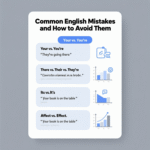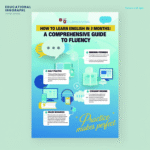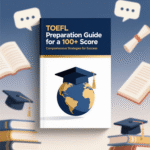Achieving a TOEFL score of 100 or higher is a significant milestone for non-native English speakers aiming to study or work in English-speaking environments. The Test of English as a Foreign Language (TOEFL) assesses proficiency in reading, listening, speaking, and writing, and a high score demonstrates advanced language skills. We have crafted this detailed TOEFL preparation guide to provide actionable strategies, expert tips, and practical resources to help candidates excel. Whether aiming for university admissions or professional certification, this guide offers a roadmap to surpass the 100-point mark.
- Understanding the TOEFL Test Structure
- Creating a Personalized TOEFL Study Plan
- Weeks 1–2: Diagnostic and Foundation Building
- Weeks 3–5: Skill Development
- Weeks 6–8: Intensive Practice
- Weeks 9–12: Final Preparation
- Essential TOEFL Preparation Resources
- Strategies for Each TOEFL Section
- Advanced Reading Strategies
- Mastering Listening Comprehension
- Excelling in Speaking Tasks
- Crafting High-Scoring Essays
- Time Management During the TOEFL Test
- Common Mistakes to Avoid
- Building Confidence and Reducing Test Anxiety
- Leveraging Technology for TOEFL Preparation
- Tailoring Preparation for Specific Goals
- Advanced Tips for Scoring Above 100
- Maintaining Motivation Throughout Preparation
- Preparing for Test Day
- Post-Test Steps
- Recommendations and Suggestions
- Frequently Asked Questions (FAQs)
Understanding the TOEFL Test Structure
The TOEFL iBT (Internet-Based Test) is the most common format, divided into four sections: Reading, Listening, Speaking, and Writing. Each section is scored out of 30, for a total of 120 points. A score of 100+ indicates strong proficiency, often required by top universities. We begin by breaking down each section to clarify expectations.
TOEFL Reading Section
The Reading section includes 3–4 academic passages, each approximately 700 words, followed by 10 questions per passage. Candidates have 54–72 minutes to complete it. Passages cover topics like science, history, and social sciences, requiring comprehension of main ideas, vocabulary, and inferences.
-
Develop Active Reading Skills: Skim passages to identify main ideas, then read actively to note key details like arguments, examples, and conclusions.
-
Expand Vocabulary: Learn academic words (e.g., “hypothesis,” “synthesis”) using flashcards or apps like Anki.
-
Practice with Authentic Materials: Read journals like Scientific American or The Economist to familiarize with complex texts.
-
Time Management: Allocate 18–20 minutes per passage. Answer easier questions first to maximize points.
TOEFL Listening Section
The Listening section features 4–6 lectures (3–5 minutes each) and 2–3 conversations (about 3 minutes each), with 5–6 questions per audio. Candidates have 41–57 minutes to complete it. Lectures mimic university settings, while conversations reflect campus life.
-
Improve Note-Taking: Use shorthand to capture main ideas, supporting details, and speaker intent during audio clips.
-
Train with Diverse Accents: Listen to podcasts like NPR or BBC Learning English to adapt to American, British, and Australian accents.
-
Practice Active Listening: Focus on tone, emphasis, and transitions to understand implied meanings.
-
Simulate Test Conditions: Use official TOEFL practice tests to build stamina for extended listening.
TOEFL Speaking Section
The Speaking section includes four tasks: one independent (personal opinion) and three integrated (combining listening, reading, and speaking). Candidates have 17 minutes total, with responses scored for clarity, coherence, and pronunciation.
-
Master Response Structure: For independent tasks, use a clear format: introduction, two reasons, and examples. For integrated tasks, summarize key points from reading/listening before stating your response.
-
Practice Pronunciation: Use tools like ELSA Speak to refine intonation and stress patterns.
-
Record and Review: Record practice responses to evaluate fluency and coherence.
-
Time Responses: Practice delivering 45–60-second answers to stay within time limits.
TOEFL Writing Section
The Writing section includes two tasks: an Integrated task (20 minutes) and an Independent task (30 minutes). The Integrated task requires summarizing a lecture and passage, while the Independent task involves writing an essay based on a prompt.
-
Craft Clear Essays: Use a five-paragraph structure (introduction, three body paragraphs, conclusion) for the Independent task.
-
Integrate Sources Effectively: For the Integrated task, synthesize lecture and passage points without copying verbatim.
-
Enhance Grammar and Vocabulary: Use varied sentence structures and precise vocabulary to demonstrate proficiency.
-
Proofread: Reserve 2–3 minutes to check for spelling and grammar errors.
Creating a Personalized TOEFL Study Plan
A structured study plan is critical for achieving a TOEFL score of 100+. We recommend dedicating 8–12 weeks, studying 2–4 hours daily, depending on your current proficiency. Below is a sample plan tailored for success.
Weeks 1–2: Diagnostic and Foundation Building
-
Take a Diagnostic Test: Use an official ETS TOEFL practice test to assess baseline scores.
-
Set Goals: Identify target scores for each section (e.g., 25+ per section for a 100+ total).
-
Build Vocabulary: Learn 20–30 academic words daily using flashcards or apps.
-
Familiarize with Test Format: Review TOEFL structure and question types using ETS resources.
Weeks 3–5: Skill Development
-
Reading: Practice 2–3 passages daily, focusing on speed and accuracy. Summarize main ideas in your own words.
-
Listening: Listen to 2–3 lectures/conversations daily, taking notes and answering questions.
-
Speaking: Practice one independent and one integrated task daily, recording responses for self-evaluation.
-
Writing: Write one Integrated and one Independent essay weekly, seeking feedback from tutors or peers.
Weeks 6–8: Intensive Practice
-
Simulate Test Conditions: Take full-length practice tests weekly to build stamina and refine timing.
-
Review Weak Areas: Analyze incorrect answers to identify patterns and address weaknesses.
-
Expand Resources: Use TOEFL prep books like The Official Guide to the TOEFL Test or online platforms like Magoosh.
-
Seek Feedback: Work with a tutor or join study groups to refine speaking and writing skills.
Weeks 9–12: Final Preparation
-
Increase Test Frequency: Take 2–3 full-length practice tests weekly, aiming for consistent 100+ scores.
-
Polish Responses: Focus on fluency in speaking and coherence in writing.
-
Manage Stress: Practice mindfulness or relaxation techniques to stay calm during the test.
-
Review Strategies: Revisit time management and note-taking techniques for all sections.
Essential TOEFL Preparation Resources
We recommend leveraging high-quality resources to enhance preparation. Below are top tools and materials for achieving a TOEFL score of 100+.
-
Official ETS Materials: The Official Guide to the TOEFL Test and ETS practice tests provide authentic questions.
-
Online Platforms: Magoosh, Kaplan, and Princeton Review offer video lessons, practice questions, and mock tests.
-
Mobile Apps: Use TOEFL Prep & Practice by Magoosh or ETS TOEFL Practice Online for on-the-go study.
-
Vocabulary Tools: Quizlet, Memrise, or Anki help build academic vocabulary.
-
Listening Resources: Podcasts like All Ears English or 6 Minute English improve comprehension.
-
Speaking Tools: ELSA Speak or Speechling refine pronunciation and fluency.
Strategies for Each TOEFL Section
Advanced Reading Strategies
To excel in the Reading section, focus on understanding passage structure and question types. Common question types include factual information, inference, vocabulary, and purpose questions.
-
Skim for Structure: Identify the introduction, body, and conclusion to grasp the passage’s organization.
-
Annotate Key Points: Highlight main ideas, examples, and transitions while reading.
-
Practice Vocabulary in Context: When encountering unknown words, use context clues to infer meanings.
-
Tackle Inference Questions: Look for implied ideas rather than explicitly stated facts.
-
Use Process of Elimination: Eliminate clearly incorrect answers to narrow choices.
Mastering Listening Comprehension
The Listening section tests your ability to understand spoken English in academic and conversational contexts. Effective note-taking and focus are key.
-
Develop a Note-Taking System: Use symbols (e.g., → for cause-effect) to capture key points quickly.
-
Focus on Main Ideas: Note the speaker’s purpose and main arguments, not minor details.
-
Practice with Distractions: Train in noisy environments to simulate test conditions.
-
Review Audio Clips: If possible, replay practice audio to identify missed details.
-
Understand Question Types: Prepare for detail, attitude, and purpose questions.
Excelling in Speaking Tasks
The Speaking section requires clear, concise, and well-organized responses. Practice is essential to build confidence and fluency.
-
Use Templates: For independent tasks, follow a structure: state your opinion, provide two reasons, and support with examples.
-
Integrate Information: For integrated tasks, summarize reading and listening content before adding your perspective.
-
Practice with Timers: Ensure responses fit within 45–60 seconds.
-
Work on Pronunciation: Focus on stress, intonation, and pacing to sound natural.
-
Seek Feedback: Share recordings with teachers or peers for constructive critique.
Crafting High-Scoring Essays
The Writing section demands clarity, coherence, and grammatical accuracy. Both tasks require distinct approaches.
-
Integrated Task Tips:
-
Summarize the lecture and passage in 150–225 words.
-
Use reporting verbs (e.g., “states,” “argues”) to integrate sources.
-
Avoid personal opinions; focus on summarizing.
-
-
Independent Task Tips:
-
Write 300–350 words with a clear thesis and supporting arguments.
-
Use transitions (e.g., “furthermore,” “however”) for coherence.
-
Include specific examples to strengthen arguments.
-
-
Polish Grammar: Avoid common errors like subject-verb agreement or misplaced modifiers.
-
Practice Typing: Ensure typing speed is sufficient for timed essays.
Time Management During the TOEFL Test
Effective time management is crucial for a TOEFL score of 100+. We outline strategies for each section.
-
Reading: Spend 1–2 minutes skimming, 15–18 minutes answering questions per passage. Skip difficult questions and return if time allows.
-
Listening: Take concise notes during audio clips. Answer questions immediately after each clip to maintain focus.
-
Speaking: Allocate 15–20 seconds to plan responses, leaving ample time for delivery.
-
Writing: Spend 3–5 minutes planning, 12–15 minutes writing, and 2–3 minutes proofreading for each task.
Common Mistakes to Avoid
Even strong candidates make errors that lower scores. We highlight pitfalls and solutions.
-
Overcomplicating Answers: Keep speaking and writing responses clear and concise.
-
Ignoring Instructions: Follow task prompts precisely, especially for integrated tasks.
-
Poor Time Management: Practice pacing to avoid rushing or incomplete responses.
-
Neglecting Vocabulary: Use varied, academic words to demonstrate proficiency.
-
Skipping Practice Tests: Regular mock tests build familiarity and confidence.
Building Confidence and Reducing Test Anxiety
Test anxiety can hinder performance. We offer techniques to stay calm and focused.
-
Practice Mindfulness: Use deep breathing or meditation to reduce stress.
-
Visualize Success: Imagine completing the test confidently to boost morale.
-
Simulate Test Day: Take practice tests in a quiet, timed environment to mimic real conditions.
-
Prepare Logistically: Know the test center location, bring required ID, and arrive early.
Leveraging Technology for TOEFL Preparation
Technology can enhance study efficiency. We recommend tools to streamline preparation.
-
Online Courses: Platforms like Coursera or Udemy offer TOEFL prep courses with expert guidance.
-
Practice Apps: TOEFL Go! by ETS provides mobile-friendly practice questions.
-
Speech Analysis Tools: Apps like Grammarly or ProWritingAid improve writing clarity.
-
Virtual Study Groups: Join forums like Reddit’s r/TOEFL for peer support and tips.
Tailoring Preparation for Specific Goals
Different candidates have unique needs based on their target scores or institutions. We address common scenarios.
-
University Admissions: Research score requirements for target schools (e.g., 100 for top U.S. universities).
-
Professional Certification: Some fields require higher speaking or writing scores; prioritize these sections.
-
Weak English Background: Extend preparation to 12–16 weeks, focusing on foundational skills like grammar and vocabulary.
Advanced Tips for Scoring Above 100
To exceed the 100-point threshold, we suggest advanced strategies.
-
Analyze High-Scoring Responses: Study sample speaking and writing responses from ETS to understand scoring criteria.
-
Focus on Weak Sections: Allocate extra study time to sections where scores are below 25.
-
Use Authentic Materials: Engage with academic texts and lectures to mirror test content.
-
Hire a Tutor: Personalized feedback can address specific weaknesses.
-
Track Progress: Maintain a study journal to monitor improvements and adjust strategies.
Maintaining Motivation Throughout Preparation
Staying motivated during weeks of study is challenging. We offer tips to sustain momentum.
-
Set Milestones: Celebrate small achievements, like improving a section score by 5 points.
-
Study with Peers: Join TOEFL study groups for accountability and encouragement.
-
Visualize Goals: Keep your end goal (e.g., university admission) in mind to stay focused.
-
Take Breaks: Schedule rest days to avoid burnout and maintain productivity.
Preparing for Test Day
A successful test day requires logistical and mental preparation. We outline key steps.
-
Know the Test Center: Visit the location in advance to plan travel time.
-
Pack Essentials: Bring valid ID, test confirmation, and snacks for breaks.
-
Sleep Well: Aim for 7–8 hours of sleep the night before to stay alert.
-
Arrive Early: Reach the test center 30 minutes early to avoid stress.
Post-Test Steps
After completing the TOEFL, we recommend follow-up actions to maximize your score’s impact.
-
Review Scores: Check results online within 6 days of the test date.
-
Send Scores: Use ETS’s score reporting service to send results to institutions.
-
Retake if Needed: If your score is below 100, analyze weaknesses and schedule a retake after 4–6 weeks of study.
-
Celebrate Success: Acknowledge your hard work, regardless of the outcome.
Recommendations and Suggestions
To achieve a TOEFL score of 100+, we emphasize consistency, practice, and strategic preparation. Invest in official ETS materials for authentic practice, use technology to enhance learning, and simulate test conditions regularly. Tailor your study plan to address weaknesses, and seek feedback from tutors or peers. Stay motivated by setting clear goals and rewarding progress. On test day, remain calm, manage time effectively, and trust your preparation.
Frequently Asked Questions (FAQs)
-
What is a good TOEFL score?
A score of 100+ is considered strong, meeting requirements for most top universities and professional certifications. -
How long should I prepare for the TOEFL?
We recommend 8–12 weeks of dedicated study, with 2–4 hours daily, depending on your proficiency. -
Can I retake the TOEFL if I don’t score 100?
Yes, you can retake the test after a 3-day waiting period. Focus on weak areas before retaking. -
What are the best TOEFL preparation resources?
Official ETS materials, Magoosh, Kaplan, and apps like TOEFL Go! are highly effective. -
How is the TOEFL scored?
Each section (Reading, Listening, Speaking, Writing) is scored out of 30, for a total of 120. -
How can I improve my TOEFL Speaking score?
Practice with timers, record responses, and use tools like ELSA Speak for pronunciation. -
What types of passages are in the TOEFL Reading section?
Passages are academic, covering topics like science, history, and social sciences. -
How do I manage time during the TOEFL test?
Allocate specific time for each section, prioritize easier questions, and practice pacing. -
Can I use a dictionary during the TOEFL?
No, dictionaries are not allowed during the test. -
How do I prepare for the TOEFL Listening section?
Listen to academic lectures and podcasts, practice note-taking, and familiarize with diverse accents. -
What is the difference between TOEFL iBT and PBT?
The iBT is internet-based and more common, while the PBT (paper-based) is offered in limited locations. -
How can I improve my TOEFL Writing score?
Practice structured essays, use varied vocabulary, and proofread for errors. -
Are there breaks during the TOEFL test?
Yes, a 10-minute break is provided after the Listening section. -
How soon can I see my TOEFL scores?
Scores are available online within 6 days of the test date. -
Can I prepare for the TOEFL without a tutor?
Yes, with self-discipline and quality resources, self-study can lead to a 100+ score.









